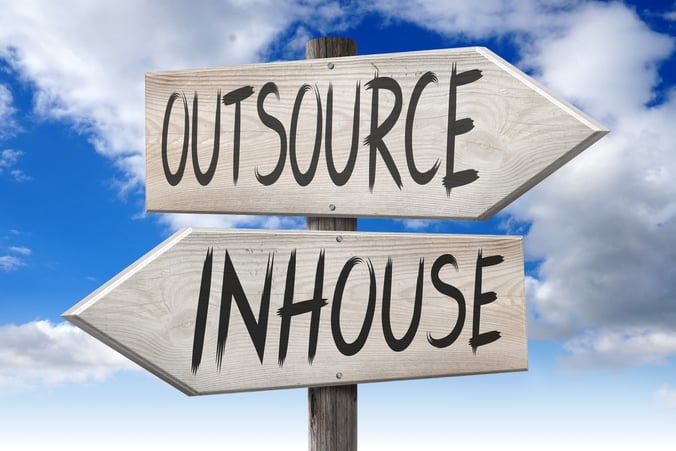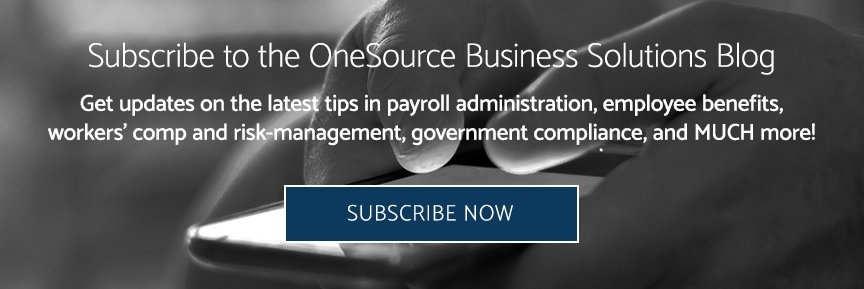OneSource Business Solutions Blog
In-House vs. Outsourcing HR

HR is an essential function of your business. However, when HR duties fall upon business owners or other employees, it can become a distraction from important core functions. For many small businesses, the question comes up as to whether to keep all of your HR in-house or to outsource it.
Each of these options has its advantages and disadvantages. For many companies, a hybrid option (where some functions are outsourced and others kept in-house) is the best of both worlds.
Understanding the advantages and disadvantages of outsourcing HR can help you make this difficult decision.
Why Outsource HR?
There are several reasons why you might want to outsource HR functions.
Cost Savings
A HR specialist costs an average of $51,688 a year in salary alone. This does not include the cost of hiring, onboarding, training, benefits, etc. This is a reasonable cost if you have enough work for a full-time specialist, but many companies do not. Alternatively, they may have enough work for, say, about one and a quarter people. Then, you end up overloading the specialist or farming out routine tasks to other employees.
When you outsource HR, you pay for the HR time you actually need, which costs a fraction of hiring a full-time person and results in a lot less paperwork. With certain outsourcing methods you can also save money on benefits and workers' compensation by using economies of scale.
Access to Expertise
HR functions require a lot of varied expertise, especially if you have employees in multiple states, remote workers, or other complexities. The amount of expertise needed is hard to get in a small team.
Meanwhile, an outsourcing partner can afford to hire experts in all of these fields and make that expertise available to you as needed. Their people also see a lot more different situations which might happen to their other clients.
The level of expertise available can also lead to further cost savings. For example, their experts are less likely than your in-house people to create expensive compliance issues which can lead to fines and legal action. Your outsourcing partner can also afford the kind of software needed to keep track of labor laws in multiple states.
There are also some good reasons to keep HR in-house, however.
Why Keep HR In-House?
While HR outsourcing has its benefits, not having any in-house HR reps has two fairly major drawbacks.
Distance
Outsourced HR generally works at a different location which makes them harder to access. They are unlikely to show up to office social functions, keeping them at a distance from employees. They are also not in a good position to observe your company culture, your key goals, etc. Their goals are to ensure your HR runs smoothly, but that goal can be less integrated into the overall strategy for your company.
This can result in employees feeling alienated from HR and not trusting them, which then results in a weak company culture, low engagement, and employees being unwilling to bring up issues. When employees are afraid or unable to complain, problems fester until key employees leave (and possibly take others with them), and those problems will also affect productivity and even safety. Meanwhile, the negative aspects of HR tend to remain, further alienating employees.
While there is a way to fix this issue, there is a second one that cannot be fixed.
Too Large
Above a certain company size (generally 500 or more employees) it becomes more cost-effective to keep payroll and other administrative tasks in-house. Outsourcing is generally more beneficial to smaller employers.
This doesn't mean that these large companies can't benefit from some limited outsourcing, but in general, there is a point where doing everything in-house is cheaper and easier. Many companies reduce the amount of HR outsourcing they do as they get larger and have enough work to warrant more full-time employees.
So, how do you get the best of both worlds? How can you outsource HR without a feeling of alienation?
The answer is to create a hybrid HR model.
The Best of Both Worlds
To get the best of both worlds, you should partner with a professional employer organization (PEO). PEOs are designed not to replace your in-house HR, but to support them by taking on monotonous tasks like payroll. They offer the expertise you need to avoid expensive compliance issues and ensure that you are not farming out mundane HR tasks on other employees who need to focus on your core business.
Instead of handling the routine tasks, your in-house HR team is freed to work on keeping your company culture strong and supporting your strategic goals. Because you still have that in-house HR, you avoid the employee alienation problem while ensuring that HR people are there to help any employee who might have an issue. Your in-house HR can work on things such as establishing hiring parameters that support your values.
The hybrid solution of a PEO optimizes the efficiency of your in-house HR, allowing you to avoid adding extra staff prematurely, through an outsourcing method that takes routine tasks off of your hands. Don’t settle for an “all in-house” or “all-outsourced” HR department when a combination is more cost-effective and productive for small- and medium-sized businesses.
Recent Posts
Posts by Topic
- HR Outsourcing (37)
- Employee Benefits (14)
- Payroll & HR Administration (5)
- Strategic Planning & Research (5)
- Company Culture (4)
- HR Compliance (4)
- Industry – Professional Services (4)
- PEO (4)
- Workers’ Comp (4)
- Employee Turnover (3)
- OneSource PEO Company News (3)
- performance management (2)
- Navigating COVID-19 (1)
- manufacturing industry (1)
